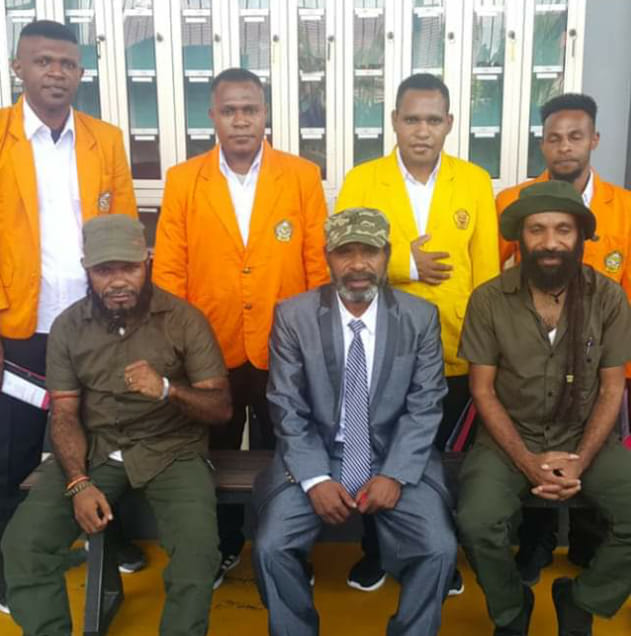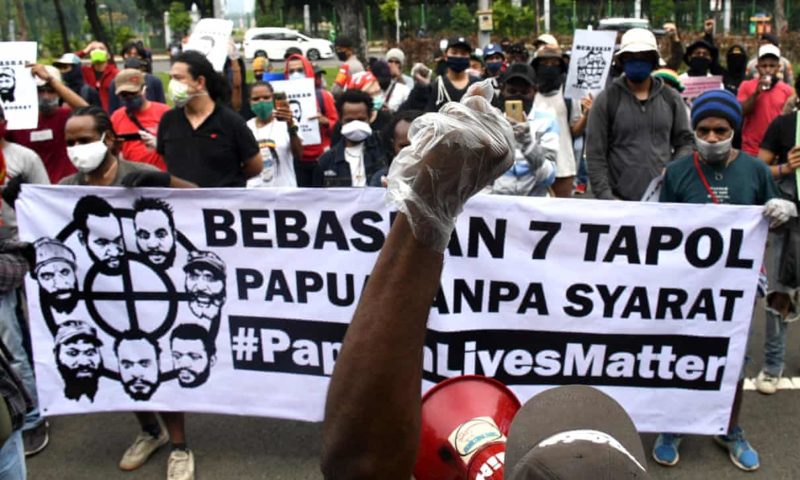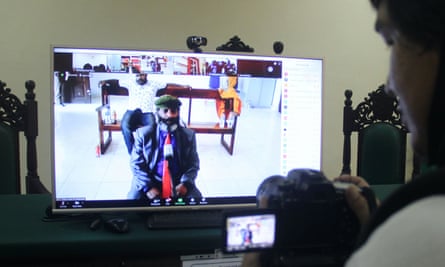West Papuan activists convicted of treason after anti-racism protests
June 17, 2020
Originally published in The Guardian
Seven Papuan activists have been found guilty of treason and sentenced to up to 11 months in prison for their involvement in anti-racism rallies in West Papua last year, a verdict that has been condemned by human rights groups.

The men, known as the “Balikpapan Seven”, were convicted over protests that were sparked last summer by a viral video in which Papuan students were called “monkeys” and subjected to other racist taunts. Thousands of people took part in the rallies, some of which turned violent.
Prior to Wednesday’s hearing, protests calling for the treason charges to be dropped took place in cities across Indonesia, where the Black Lives Matter movement has prompted greater discussion of injustices facing West Papuans.
Indonesian prosecutors had sought up to 17 years in jail.
Filep Karma, a Papuan activist who was jailed for more than 10 years in 2004 for waving the Morning Star flag – a symbol of Papuan independence banned in Indonesia – said that the shorter sentences may reflect the level of attention the case has received domestically and abroad.
“It seems that the country is considering the international pressure, and also perhaps they are afraid that Papua will be in turmoil again,” he said. “If the Indonesian government is truly fair and being honest that they have committed to wrongdoing when arresting these people, they have to admit and give them compensation,” he said.

Human Rights Watch added that the Papuans should not stay “even a single night behind bars”.
“They were protesting against racism but are convicted of treason,” Andreas Harsono, Indonesia researcher at Human Rights Watch, told Reuters.
“The offence here is not the Papuans’ actions, but Jakarta’s willingness to prosecute peaceful dissent and tarnish Indonesia’s international reputation.”
Papua police, Indonesia’s national police and the president’s office did not immediately respond to a request for comment.
Protests against racial abuse against Papuan students, allegedly perpetrated by the police, began in Jayapura in August last year. They began mostly peaceful, but the second wave of the rallies turned violent, with protesters burning the parliamentary building, public facilities, and shopping stores.
The protests continued for a month and spread across the region, from the coast of Manokwari to the highland of Deiyai. Witnesses alleged that dozens of protesters were detained and killed by Indonesian security forces.
The Indonesian government accused the Balikpapan Seven of using the protest to promote the “Free West Papua” campaign.
West Papua, which is located in the western part of New Guinea island, was a former Dutch colony until it was absorbed into Indonesia in 1969.

Buchtar Tabuni, one of the Balikpapan Seven, takes a part in a trial, at the Balikpapan district court in East Kalimantan province. Photograph: Reuters
The Balikpapan Seven – Buchtar Tabuni, a prominent leader of the National Parliament of West Papua and the United Liberation Movement for West Papua; Agus Kossay and Stevanus Itlay, of the National Committee of West Papua (KNPB); Alexander Gobay, Irwanus Uropmabin and Hengki Hilapok, students from Jayapura University of Science and Technology (USTJ), and Cenderawasih University student union executive Ferry Gombo – all denied the allegations of treason.
A total of 36 other Papuan political prisoners are still imprisoned for treason after the uprising last year. Karma said they should be urgently released, and cited the concern over the spread of Covid-19 in Indonesian prisons.